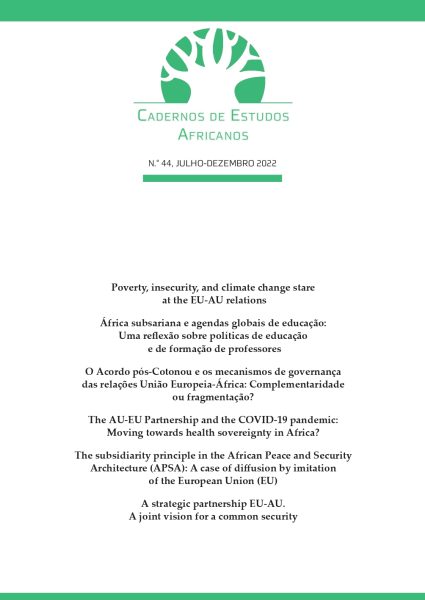On 22 April, the launch of issue 44 of the journal Cadernos de Estudos Africanos will take place, dedicated to the theme “Europe-Africa Relations“.
The issue is edited by CEI-Iscte researchers Pedro Seabra, Clara Carvalho and Inês Marques Ribeiro.
The session starts at 6pm in Auditorium C1.03 (Ed. 2, Iscte). Free entry.
Alternatively you can watch via zoom: https://videoconf-colibri.zoom.us/j/91000654478

Introduction:
Since the inception of the European Communities, Africa has been on the horizon for the development of foreign and diplomatic relations, largely due to European states’ will to maintain relations with former colonies and to exert some form of normative power (Haastrup, 2013). However, both the institutional developments in practice and the study of European-African relations have been marked by an asymmetrical hierarchical relationship imbued with post-colonial characteristics.
The European Communities’ diplomatic and strategic relations with the African continent date back to the Treaty of Rome (1957) and the launching of the African, Caribbean and Pacific Group of States (ACP), since 2020 renamed the Organisation of African, Caribbean and Pacific States (OACPS) (Raimundo, 2021). The European Union-Africa Union Summit was launched in 2000 (by then not including all African countries), aimed at overcoming the limitations of the ACP agreements, particularly trade restrictions. The Joint Africa-EU Strategy (JAES), set up at the Lisbon Summit of 2007, established a roadmap of intentions stressing partnership engagement but not clarifying its operationalization or its funding, which later summits tried to implement (Kell & Vines, 2020).
In February 2022, the 6th European Union-African Union Summit took place in Brussels. The Joint Vision for 2030, agreed upon in Brussels, focused on security, human rights, gender equality, children’s rights, youth, democracy, the rule of law and good governance, climate change, and food security. It also added a new priority, namely equitable access to vaccines. The main announcements, however, concerned the Global Gateway, a €150 billion project geared towards infrastructure investment in Africa as well as funding for the manufacturing of the SARS-COVID-19 vaccine in six African countries (Egypt, Kenya, Nigeria, Senegal, South Africa, and Tunisia) (European Council, 2022).
The almost concomitant Ukrainian invasion by the Russian Federation and the support given to the Ukrainian government by the EU overcame the visibility of these projects (Carbone, 2023). Their influence remains nonetheless, as do the criticisms that persist, summit after summit, concerning the lack of a real partnership. The postponement of debt relief restructuring remains a key problem, which would allow some African economies to stabilize (Shiferaw, 2023). On the positive side, it is possible to highlight the European support of continental initiatives such as the African Continental Free Trade Area (AfCFTA), the African Peace Fund, and the reinvigorated role of the Africa Centres for Disease Control (CDC).
This special issue, although not exclusively dedicated to this level of analysis, has a clear focus on EU-AU relations from different perspectives. The most prevalent topic is security, with several articles delving into this issue in the relationship between the EU and the AU.